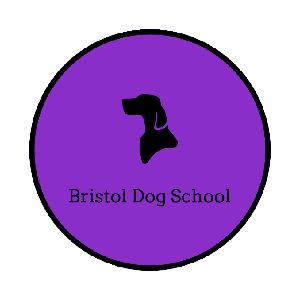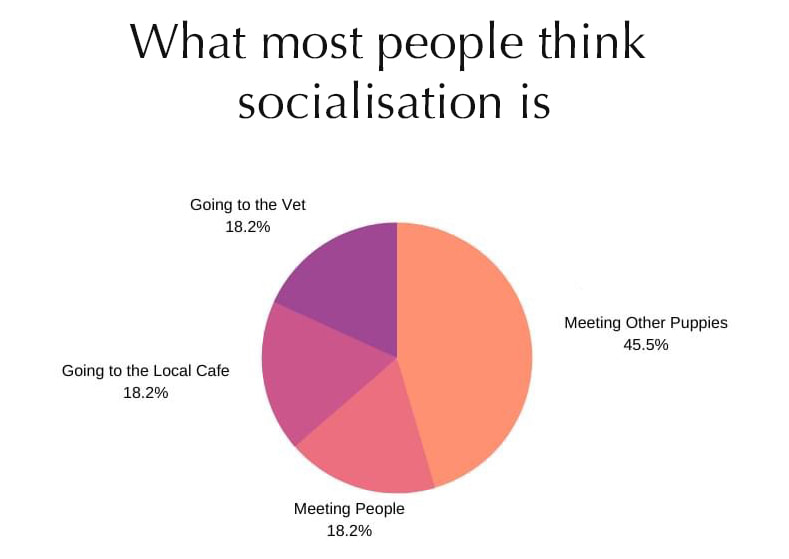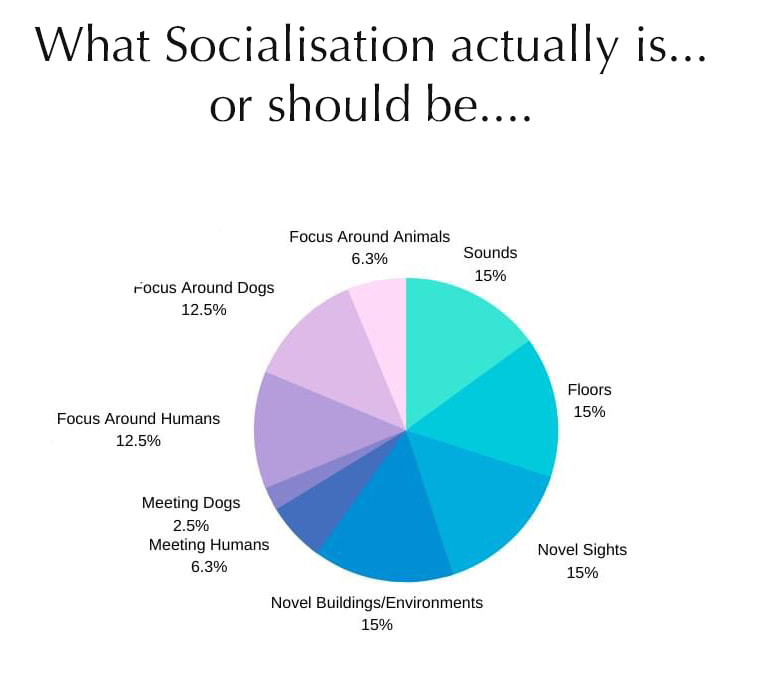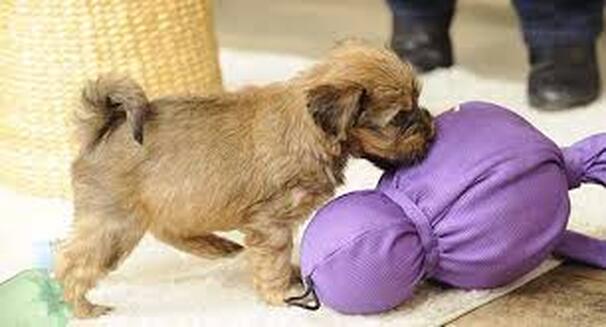|
The dictionary describes socialisation in these two ways 1. the activity of mixing socially with others."socialisation with students has helped her communication skills" 2. the process of learning to behave in a way that is acceptable to society."pre-school starts the process of socialisation" In short socialisation is about experiencing things and spending time with others to make you more able to cope and exist in society. When does socialisation start? Pups are born deaf and blind, the first 3 weeks of life for a puppy are about Filial imprinting with their mother and siblings. As they grow they enter new stages known as critical learning or sensitive periods The first or socialisation period is from 4-14 weeks when pups are weaning, their senses are developing, they’ll be venturing out of the whelping box playing and exploring, maybe going to the Vet for the first time and at around 8 weeks old they’ll be leaving their litter mates and going to new homes and possibly starting to attend puppy training classes. The second period is the Juvenile or enrichment socialisation period which lasts from 14 weeks to 6 months or sometimes longer depending on the type of dog this is sometimes called the teenage stage as they will undergo hormone and physical growth surges. They’ll still be learning and their world be increasing in size every day they will be experiencing new things and may still be attending puppy classes or maybe attending adolescent classes. Pups during their critical periods are sponges for information and this is the time we should be helping them to learn what is and isn’t acceptable. but socialisation doesn't stop after the critical periods end it carries on through life, but giving them good socialisation experiences when young means they are better able to cope with new things as older dogs. What is socialisation meant to be and what problems may we see. The socialisation and juvenile periods are where I start to see confusion in what suitable socialisation is for pups. So many new puppy owners think that socialisation only means letting their puppy play with other dogs, I so often hear “I don’t want my puppy to be scared or aggressive so I let him play with all the dogs in the park, but he just won’t come back when he’s called” or “I let him play with all the dogs in the park and he used to come back to me when I called him, but now he ignores me and just won’t come back” or my puppy is just so scared of other dogs he hides behind my legs or runs away and I don’t know why we go to puppy parties they’re not helping”. These owners often think that socialisation with other dogs is letting their little puppy play with all dogs he meets, and of course pups do need to meet and play with other dogs of all ages so that they can learn and grow, but this socialisation needs to be carefully considered. What is socialisation meant to be? Socialisation is really about letting your puppy experience as much social contact with humans of different types, other dogs and other pets as possible but in smaller doses with a positive outcome, remember it’s about quality not quantity. And socialisation also encompases habiuation to new experinces, for example hearing the vacuum cleaner for 10 seconds is adequate at first and the puppy should be calmly praised and fussed and rewarded so that the vacuum is not a scary noisy thing but the precursor to something nice for the puppy. This could then be repeated a few day’s later in the same manner you may find that the first time the puppy experiences the sound and seeing the vacuum it's particularly interested, but the second it's less interested. What about puppy classes or parties?
Puppy training classes aren't generally called a puppy parties, parties are put on to let pups play in social groups and often there is little control and pups can become stressed. A good training class will not encourage pups to play in groups, it will be run by an experienced and qualified trainer who may have some organisational affiliation or not, they should use reward based methods and will encourage you to bond and learn and play with your pup while other pups and people are around. Letting pups play in groups with no proper control can lead to some pups becoming nervous of other dogs and others becoming overly confident and almost bullying of the less confident pups, if there is social contact in a puppy class then generally the trainer will only match pups in no more than pairs for a short controlled period. Socialisation on walks Allowing your puppy to run up to and play with every dog on walks teaches it that it is allowed to run up to every dog and encourage it to play. But not every dog wants to play or is able to play. Think of those dogs on leads in particular some are elderly and frail, some are ill or recovering from injury and possible surgery and some are just too scared of others to be able to cope with social greeting and they react out of fear. As a result of some of these interactions the puppy may learn to run up to other dogs and defend it's self before a proper social meeting has taken place with the other dog. So how do we remedy this? Interacting with your own puppy on walks is paramount this, I so often hear I got a puppy to get me out and about and enjoy walks with them, but when these people are on walks the dog is off elsewhere making their own fun or the owner is on their phone paying little attention to what their dog is doing. playing little find it games with toys or laying scent trails with treats or playing controlled retrieve games and even doing some training are all great ways to interact with your puppy on walks. And then there is the rule of 3 1. You must stay with me 2. You can say hello 3. You can play with This is a great rule to follow it allows the puppy to socialise in different ways but also teaches it that sometimes it’s not appropriate to say hello, and this is where you will find your pup recall improves. Making a socialisation plan Vaccinations and not being able to take puppy out until a week after they have finished is often sighted as the reason pups socialisation is suspended, but this needent mean you can’t take your puppy out and socialise it or start a puppy training class. You can now get puppy carrying bags so that they go out with you before they are able to head out on walks on a lead, Pups can be carried by you while you sit outside of supermarkets and let them see people and cars or you could just sit outside your house. I used a normal rucksack to carry my puppy and he joined me on my walks with my older dog so he got to experience everything we did. you can see photo's of Atum in a rucksack on a walk on our puppy vaccination policy for attending classes . I also make a plan, what are all the things that puppy may encounter as it grows up, car’s, hairdryers, vacuum cleaners, and then runners and cyclists traveling in cars or on buses, sitting in a pub or a school playground, people in sunglasses or wearing hats, children in play parks other animals. literally everything is listed so they can be ticked off each time puppy encounters them. You can keep adding new things all the time and you know that you may have to encounter them again just to make sure you puppy is getting used to them. Enlisting the help of a force free puppy trainer even before you bring your puppy home, will help you start off on the right foot. They can go through important socialisation with you and help you write your socialisation plan, some may also be able to discuss harnesses and diet with you. References Gazzano, A., Mariti, C., Notari, L., Sighieri, C. and McBride, E. (2008). Effects of early gentling and early environment on emotional development of puppies. Applied Animal Behaviour Science, 110(3-4), pp.294-304. Howell, T., King, T. and Bennett, P. (2015). Puppy parties and beyond: the role of early age socialization practices on adult dog behavior. Veterinary Medicine: Research and Reports, p.143. Knudsen, E. (2004). Sensitive Periods in the Development of the Brain and Behavior. Journal of Cognitive Neuroscience, 16(8), pp.1412-1425. Overall, K. (2013). Manual of Clinical behavioural medicine for dogs and cats. 1st ed. Elsevier, p.123. SCOTT, J. (1958). Critical Periods in the Development of Social Behavior in Puppies. Psychosomatic Medicine, 20(1), pp.42-54. Thompson, K., McBride, E. and Redhead, E. (2010). Training engagement and the development of behavior problems in the dog: A longitudinal study. Journal of Veterinary Behavior, 5(1), p.57. |
AuthorClair Litster-Huckle has a BSc (Hons) in Animal Behaviour and Welfare and an MSc Animal Behaviour and Training and has studied Canine psychology and Canine diet and nutrition. Archives |
Proudly powered by Weebly



